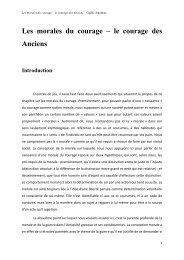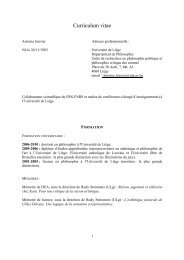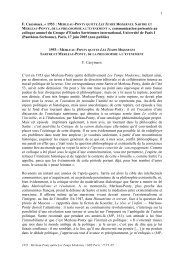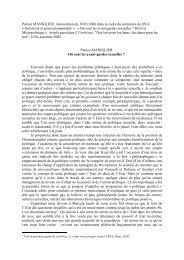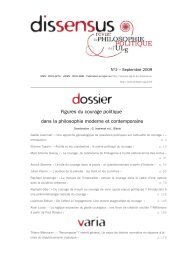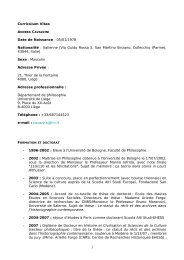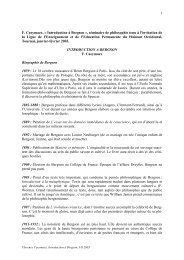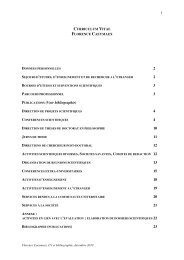Subjectivations politiques et économie des savoirs - Service de ...
Subjectivations politiques et économie des savoirs - Service de ...
Subjectivations politiques et économie des savoirs - Service de ...
Create successful ePaper yourself
Turn your PDF publications into a flip-book with our unique Google optimized e-Paper software.
– Revue <strong>de</strong> philosophie politique <strong>de</strong> l’ULg – N°5 – Mai 2013 – p. 122<br />
Sophie Bourgault: « Prolegomena to a rehabilitation of<br />
Platonic mo<strong>de</strong>ration »<br />
« it is impossible for a city to honor wealth and at<br />
the same time for its citizens to acquire<br />
mo<strong>de</strong>ration. » (Plato, Republic 555d)<br />
When United States Presi<strong>de</strong>nt Obama offered his inaugural address to an attentive<br />
national and international audience in January 2009, he did not hesitate to i<strong>de</strong>ntify<br />
excessive acquisitiveness as a central reason behind the economic crisis. In<strong>de</strong>ed, he<br />
noted that America’s woes were the consequence of « greed and irresponsibility » – an<br />
observation he also ma<strong>de</strong> earlier when unveiling his Recovery and Reinvestment Plan. 1<br />
Judging from the public mood and the relatively warm response to the capping of<br />
salaries of certain bank executives, Obama’s conclusions seem commonly embraced.<br />
Publicly at least, few would dare claim that the greed of tra<strong>de</strong>rs and bankers (or that of<br />
the average consumer) are necessarily good for soci<strong>et</strong>y. And how many would quarrel<br />
with the suggestion that there may be som<strong>et</strong>hing morally suspect about top CEOs<br />
earning 431 times more money than an average worker? 2 If Ryan Balot could write, in<br />
2001, that the i<strong>de</strong>a of « individual greed [being] good for soci<strong>et</strong>y at large has had<br />
remarkable staying-power in our culture 3 », the events of the last two years may have –<br />
temporarily at least – shaken that conviction.<br />
Now, even if many of us would readily label greed a vice, few seem ready to endorse its<br />
corresponding virtue: mo<strong>de</strong>ration. 4 If greed is out, mo<strong>de</strong>ration is not in – and this is<br />
true for both the general public and aca<strong>de</strong>mia. Apart from green political theorists and<br />
a handful of economists and theologians 5 , the virtue of mo<strong>de</strong>ration has attracted little<br />
1<br />
2<br />
3<br />
4<br />
5<br />
www.upi.com/Top_News/2009/01/08/Transcript_of_Obama_speech_on_economy/UPI-<br />
61161231435966 (accessed Jan.13 th , 2009). For the inaugural address, see<br />
www.cbc.ca/world/story/2009/01/20/obama-speech-text-html (accessed Jan.20 th , 2009).<br />
S. Hamilton & A. Mickl<strong>et</strong>hwait, Greed and Corporate Failure, New York, Macmillan, 2006, p. 4.<br />
R. Balot, Greed and Injustice in Classical Athens, Princ<strong>et</strong>on, Princ<strong>et</strong>on University Press, 2001, p. 20.<br />
Aquinas, in his Summa Theologica, sees mo<strong>de</strong>ration as the opposite of greed and gluttony.<br />
J. A. Nash, « On the Subversive Virtue: Frugality? », dans D. Crocker & T. Lin<strong>de</strong>n (éds.), Ethics of<br />
Consumption: The Good Life, Justice and Global Stewardship, Lanham, Rowman & Littlefield, 1998 ; A.



